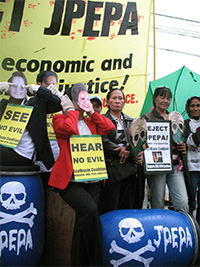Toxic Wastes in JPEPA a Real Threat
Green Groups Call on Senate Not to Ignore Environmental Issues
BAN AP / Mother Earth Foundation / Magkaisa Junk JPEPA Coalition Press Release
 |
 |
 |
 |
| |
 |
|
| |
See no JPEPA, hear no JPEPA, speak no JPEPA. Environmentalists stage a creative protest in front of the Senate protesting what they see as Pres. Arroyo and several senators, particularly Senators Mar Roxas and Miriam Defensor-Santiago ignoring the environmental threat posed by JPEPA on the Philippine environment by pushing for the ratification of the controversial accord. The environmental groups are calling for the rejection of JPEPA and for both the Philippines and Japan to renegotiate for a more just, equitable, and green trade agreement.
Image © GAIA
|
|
 |
 |
 |
|
| |
19 August 2008 (Quezon City) – “The threat posed by toxic wastes in the JPEPA is very real for Filipinos. It behooves our Senators to address this threat and not pretend that it is not there,” stated Marie Marciano, President of Mother Earth Foundation and a member of the multi-sectoral movement called the Magkaisa Junk JPEPA Coalition (MJJC) that held a creative protest in front of the Senate today.
Members of various environmental groups[i] participated in the creative protest in which mock figures of President Gloria Macapagal-Arroyo and Senators Mar Roxas and Miriam Defensor-Santiago sat on toxic waste barrels marked JPEPA, miming the common phrase “see no evil, speak no evil, hear no evil”. In this instance the three figures are metaphorically washing their hands of JPEPA and the toxic waste nightmare it will bring.
In May of 2007, Japanese Foreign Minister Taro Aso executed a side note expressing Japan’s promise not to export hazardous wastes to the Philippines, as long as it follows Philippine and Japanese laws, as well as the international treaty on toxic wastes known as the Basel Convention. According to Atty. Richard Gutierrez, Coordinator of the Asia-Pacific Office of the Basel Action Network, it is not sufficient to rely on Japan’s promise not to export toxic wastes to the Philippines because there are physical and financial incentives for Japan to export its wastes.
Citing data from the Japanese Ministry of Environment, Gutierrez stated that Japan has been generating over 50 million tons of wastes per year for the past 10 years. Because of their continued generation of waste Japan only has 13.2 years left of physical space in their landfills to dispose of their municipal waste. For their industrial wastes, the Japanese only have 6.1 years left in their landfills.
“It’s simple physics, two bodies cannot occupy the same space at the same time. You either move the Japanese out of Japan or you move the waste out of Japan. This is a no brainer,” stated Gutierrez.
“In terms of cost, the Japanese are spending 2 trillion Yen per year to deal with their wastes,” continued Gutierrez. “Why not export these wastes in the guise of raw materials to poorer countries and save money on the processing cost in Japan? This is a win-win for Japan and a major loss for the country accepting the toxic wastes.”
The environmental groups also mentioned that Japan is struggling with the growing cases of illegal dumping within its borders and data from Thailand and India have revealed that Japan is already exporting toxic wastes to these countries under existing Japanese and international laws.
According to Marciano, the promise to follow laws is not sufficient. “We need to take into account that all these laws define toxic wastes the same way and that they are all implemented rigorously. The fact that Japan is able to export toxic wastes to Thailand and India for the past three years is evidence that Japanese law and the Basel Convention do allow toxic wastes exports.”
In her privilege speech to the Senate sponsoring the ratification of the controversial treaty, Sen. Defensor-Santiago expressly stated that the Senate is recommending to Malacañang the ratification of the Basel Ban Amendment.[ii]
“If Malacañang does not endorse the Basel Ban Amendment to the Senate for ratification, this will recommendation will go nowhere,” said Gutierrez “Filipinos have the Constitutional right to a healthful ecology. This is a right based on a legal obligation not on convenience. The Filipino health and environment must constantly be protected, and not when it is politically convenient.”
End
For more details:
Atty. Richard Gutierrez, BAN AP / Magkaisa Junk JPEPA Coalition, mobile: 0917 506 7724
Marie Marciano, Mother Earth Foundation / Magkaisa Junk JPEPA, mobile: 0920 273 5325
[i] Ban Toxics!, Buklod Tao, Cavite Green Coalition, Concerned Citizens Against Pollution, Health Care Without Harm, Mother Earth Foundation and Sagip Pasig Movement.
[ii] The Basel Ban Amendment is an amendment to the Basel Convention that prohibits developed countries, i.e. members of the Organization for Economic Cooperation and Development (OECD), European Union and Liechtenstein from exporting toxic wastes, for any reason whatsoever, to developing countries. The Basel Ban Amendment was passed in 1995 and currently has 63 ratifications. Almost all developed nations party to the Basel Convention have ratified the Basel Ban Amendment. Japan is one of 7 developed countries that refuses to prohibit export of toxic wastes to poorer countries.
FAIR USE NOTICE. This document contains copyrighted material whose use has not been specifically authorized by the copyright owner. The Basel Action Network is making this article available in our efforts to advance understanding of ecological sustainability and environmental justice issues. We believe that this constitutes a 'fair use' of the copyrighted material as provided for in section 107 of the US Copyright Law. If you wish to use this copyrighted material for purposes of your own that go beyond 'fair use', you must obtain permission from the copyright owner.
More News
|